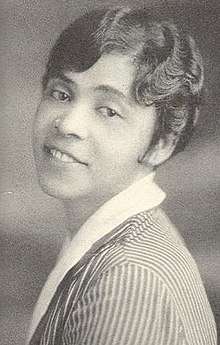Thyra J. Edwards
Thyra Johnson Edwards (December 25, 1897 – July 9, 1953) was an American educator, journalist, labor activist, and social worker.
Thyra J. Edwards | |
|---|---|
 Thyra J. Edwards, in an undated photograph. | |
| Born | Thyra Johnson Edwards December 25, 1897 Texas |
| Died | July 9, 1953 |
| Nationality | American |
| Other names | Thyra Edwards Gitlin |
| Occupation | journalist, educator, social worker, activist |
Early life
Thyra J. Edwards was from Wharton, Texas, the daughter of Horace Ferdinand Edwards and Anna Bell Johnson Edwards. Her parents were teachers in Wharton; her father was later a postal clerk in Houston. She graduated from Houston Colored High School in 1915. She trained as a social worker at the Chicago School of Civics and Philanthropy. She also studied labor politics at Brookwood Labor College,[1] and pursued further studies at the International People's College in Elsinore, Denmark, in 1933.[2]
Career and activism
Edwards started as a teacher in Texas, right after high school. She became a charter member of the Houston chapter of the NAACP when it formed in 1918. In 1919, she began working for the Houston Social Service Bureau as a family visitor, and the next year moved to Gary, Indiana with her sister, Thelma. She was based in Indiana for the next twelve years, working as a teacher, social worker, and juvenile probation officer, while lecturing and becoming more active in labor and civil rights work. In 1925 she became a child placement specialist with the Lake County Board of Guardians. In 1927 she helped to open the Lake County Children's Home, and she served as its director for three years. She was one of the founders of Gary's Interracial Commission in 1924, and served on the board of the John Stewart Social Settlement Center, a settlement house serving African-Americans in Gary. She organized the Business and Professional Women's Club in Gary. She spoke at the National Negro Business League conference in St. Louis, Missouri in 1927. She was vice-president of the Gary Council of Social Agencies, and active in the city's YWCA.[2]
Edwards traveled in Europe in 1929, and moved to Chicago in 1931, to be a social worker with the Joint Emergency Relief Commission, while living at the Abraham Lincoln Centre, a settlement house. She soon became active with the Brotherhood of Sleeping Car Porters, a black union based in Chicago, and with the Progressive Miners of America in southern Illinois. In 1933 she was part of forming the Chicago Scottsboro Action Committee. In mid-1930s, she traveled in England, Scandinavia, Austria, Germany, and the Soviet Union,[3] then on the Spain to work with child refugees of the Spanish Civil War.[4] As head of the women's committee of the National Negro Congress during World War II, she taught about the Soviet Union at the Carver School.[5]
Writing
As a journalist, Edwards wrote news articles for the Associated Negro Press.[6] She wrote from her travels for African-American periodicals including a 1932 report on a homeless men's shelter in Chicago,[7][8] a 1933 interview with Nigerian lawyer Stella Thomas, whom she described as "tall and black and real and beautiful and poised, and wrapped in flame",[9] and "Negro Literature Comes to Demark", her 1936 report from the International People's School.[10] She wrote about the Spanish Civil War in a series of articles for the Chicago Defender.[11]
Personal life
Thyra J. Edwards married steelworker James Malcolm Garnett in 1924; they divorced a year later. She married again, to Murray Gitlin, in 1943. They lived in Italy after 1948, where he was working with the American Jewish Joint Distribution Committee. She had rheumatoid arthritis. Thyra Edwards Gitlin died in 1953, aged 55 years, from breast cancer.[2][12] The Thyra Edwards Papers are archived at the Chicago History Museum.[13]
Actor William Marshall was Thyra Edwards' nephew, the son of her sister, Thelma Edwards Marshall.
References
- "Brookwood Labor College" Opportunity (December 1932): 390.
- Gregg Andrews, Thyra J. Edwards: Black Activist in the Global Freedom Struggle (Columbia: University of Missouri Press, 2011). ISBN 9780826219121
- "Thyra Edwards Writes Editor from Russia" The Chicago Defender (October 3, 1936): 24. via ProQuest
- Beth Tompkins Bates, Pullman Porters and the Rise of Protest Politics in Black America, 1925-1945 (University of North Carolina Press 2003): 117, 141. ISBN 9780807875360
- Brian Dolinar, The Black Cultural Front: Black Writers and Artists of the Depression Generation (University Press of Mississippi 2012): 58. ISBN 9781617032691
- John Maxwell Hamilton, Journalism's Roving Eye: A History of American Foreign Reporting (LSU Press 2011). ISBN 9780807144862
- Thyra J. Edwards, "Chicago in the Rain" Opportunity (May 1932): 148-149.
- Christopher Robert Reed, The Depression Comes to the South Side: Protest and Politics in the Black Metropolis, 1930-1933 (Indiana University Press 2011): 11. ISBN 9780253005526
- Thyra J. Edwards, "Stella Thomas: King's Counselor" Opportunity (December 1933): 368-369.
- Thyra J. Edwards, "Negro Literature Comes to Denmark" The Crisis (May 1936): 140-141.
- Erik S. McDuffie, Sojourning for Freedom: Black Women, American Communism, and the Making of Black Left Feminism (Duke University Press 2011): 68, 106. ISBN 9780822350507
- "Thyra Edwards Dead; Hold N. Y. Rites" The Chicago Defender (July 25, 1953): 1. via ProQuest
- Julie Wroblewski, "Descriptive inventory for the Thyra Edwards papers, 1932-1953" Chicago History Museum (2015).